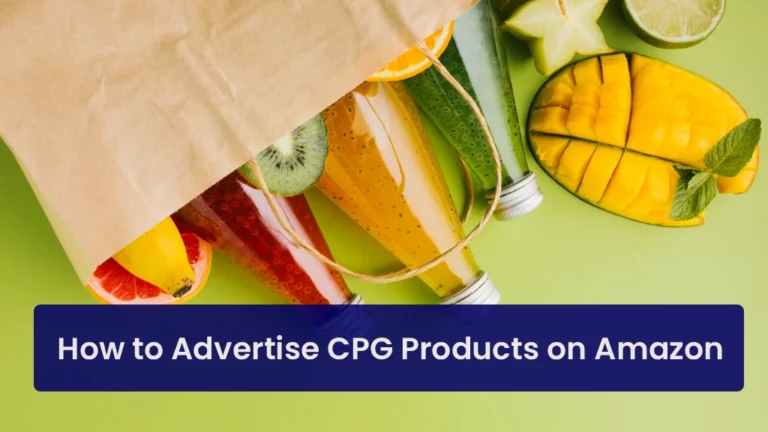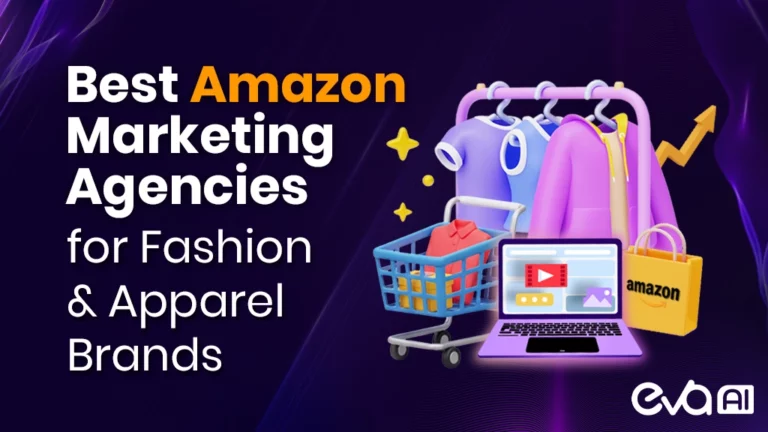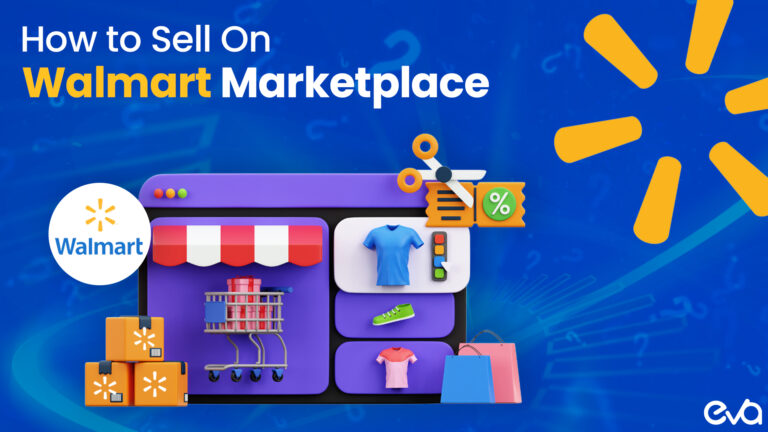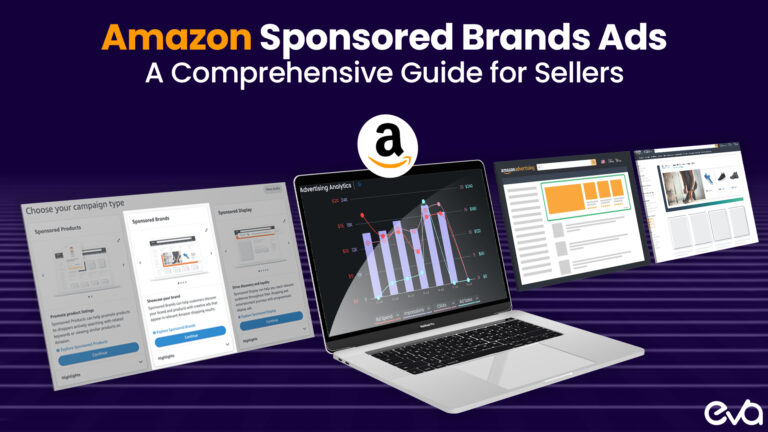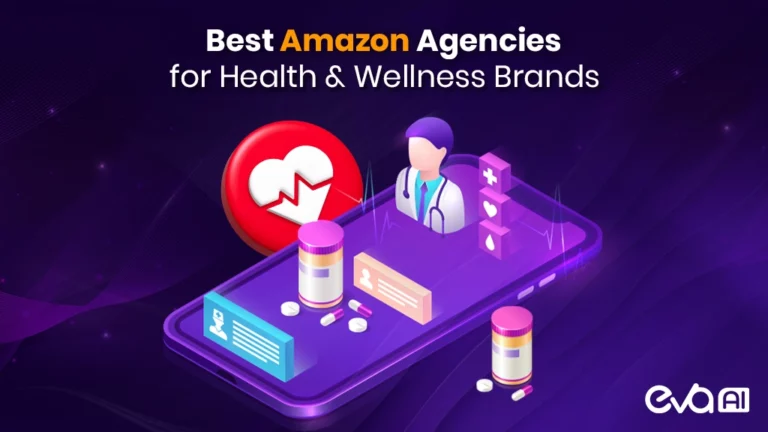“We burned through $15,000 in ad spend with nothing to show for it.”
“Our first agency doubled our ACOS in just three weeks.”
“I’ve worked with three different PPC agencies in two years—none delivered what they promised.”
These horror stories from Amazon sellers aren’t uncommon. In fact, for every success story about transformative PPC results, there seems to be a cautionary tale of disappointed expectations, mysterious strategies, and vanishing ROI.
Yet in 2025, Amazon advertising isn’t optional for most sellers. As of the first quarter of 2025, third-party (3P) sellers are responsible for 61–62% of all paid units sold on the platform. It’s clear that the platform represents a massive opportunity that increasingly requires paid visibility to fully capitalize on.
The question isn’t whether to advertise, but how, and increasingly, who should manage these critical campaigns.
The rise of specialized Amazon PPC agencies promises expertise and results that many brands don’t have the capacity to develop in-house. But here’s what many sellers discover too late: the gap between exceptional and mediocre PPC management is vast, and choosing the wrong partner can devastate your profitability while competitors surge ahead.
This guide reveals what established Amazon sellers wish they’d known before hiring their first PPC agency. These are insights that could save you thousands in wasted ad spend and months of missed growth opportunities.
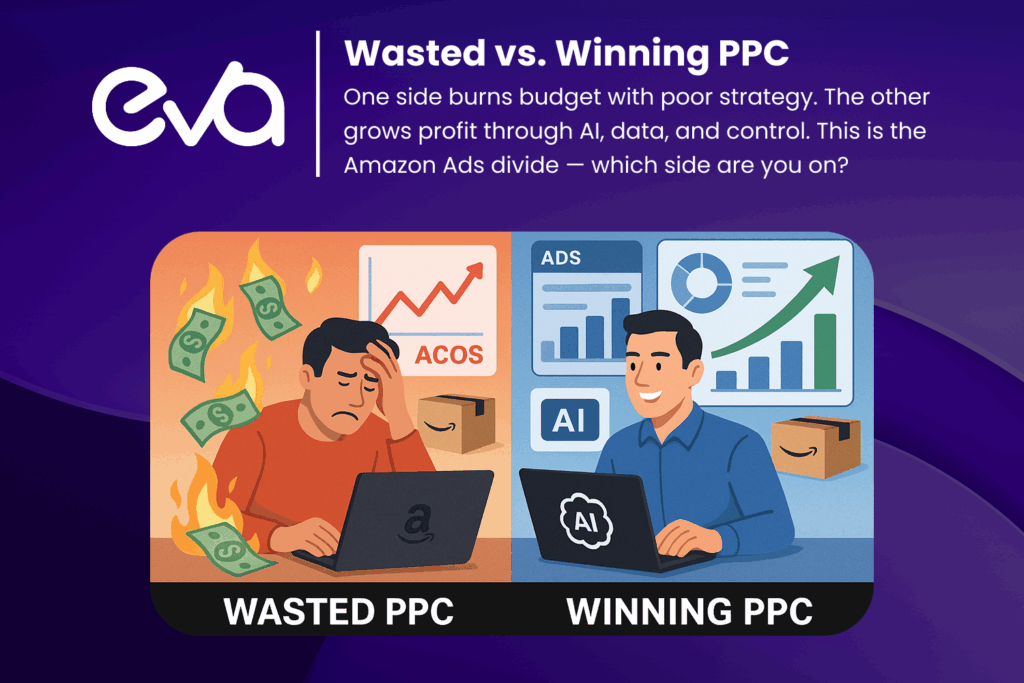
Table of Contents
- Why Do Amazon PPC Agencies Vary So Widely?
- How to Spot Inflated Performance Metrics
- Misalignment Between Amazon Agency Goals and Seller Goals
- Best Practices for Transparency and Accountability
- How to Choose the Right Amazon PPC Agency for Your Business
- Conclusion: What Sellers Wish They Knew Before Hiring
- Frequently Asked Questions About Amazon PPC Management
- How Eva Transforms Amazon Advertising Performance
Why Do Amazon PPC Agencies Vary So Widely?
The quality gap between Amazon PPC agencies is often dramatic, leaving many sellers confused about what truly differentiates one company specializing in Amazon PPC from another. Several factors contribute to this disparity:
Experience Level and Specialization
Some agencies have been optimizing Amazon campaigns since the platform’s advertising options were in their infancy, while others are newcomers trying to capitalize on the booming market. The best Amazon PPC management experts typically have deep platform-specific experience rather than general digital marketing backgrounds hastily applied to Amazon.
Especially important is whether an agency has experience with your specific product category. An agency that primarily works with health and wellness brands may struggle with the nuances of selling outdoor equipment or baby products, each of which has distinct customer behavior patterns and competitive landscapes.
Technology and Resources

Leading agencies leverage AI-powered tools that can make hourly bid adjustments and analyze vast datasets to identify optimization opportunities that would be impossible to spot manually. For instance, the difference between manual campaign management and AI-assisted optimization can mean the difference between daily or weekly adjustments versus real-time, hourly optimizations that respond instantly to marketplace changes.
Industry Reputation and Verified Results
In an industry full of bold claims, verified success stories speak volumes. Top Amazon PPC management experts can point to specific case studies with measurable results across various product categories and price points. They’re transparent about their methodologies and don’t rely on vague promises.
How to Spot Inflated Performance Metrics
One of the most common frustrations sellers express is discovering that the impressive metrics their Amazon PPC agency has been reporting don’t translate to actual business growth. Here’s how to see through the smoke and mirrors:
Metrics That Actually Matter
While agencies often highlight metrics like impressions, clicks, and even click-through rates, these are essentially vanity metrics if they don’t lead to profitable sales. The KPIs that truly matter include:
- ACOS (Advertising Cost of Sale): Shows how much you’re spending on advertising relative to the sales it generates
- TACOS (Total Advertising Cost of Sale): Measures ad spend against total sales, providing a more holistic view of advertising efficiency
- Profitability: The actual bottom-line impact after accounting for all costs including advertising, COGS, and Amazon fees
- Inventory Velocity: How advertising affects your inventory turnover and prevents stockouts or excess inventory
- Organic Rank Improvements: How your paid advertising efforts boost organic visibility and sales over time
Red Flags in Reporting
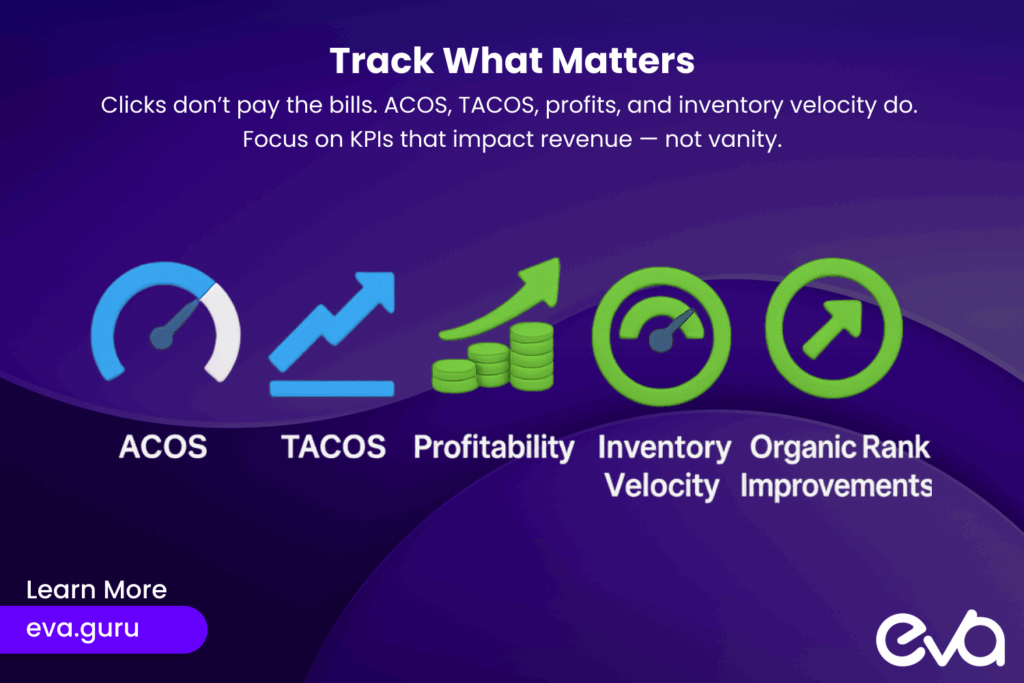
Be wary of agencies that:
- Only report on ACOS without showing the impact on overall profitability
- Focus solely on spend and revenue without addressing unit economics
- Can’t clearly explain how their strategies impact your long-term brand growth
- Fail to account for inventory constraints in their advertising approach
- Don’t provide transparent access to your actual campaign performance data
Questions to Ask About Reporting
- “How does this campaign performance translate to actual profit for my business?”
- “What metrics beyond ACOS are you tracking to ensure my business grows sustainably?”
- “How are you balancing immediate sales performance with long-term brand building?”
- “Can you show me how my advertising performance compares to similar sellers in my category?”
Misalignment Between Amazon Agency Goals and Seller Goals
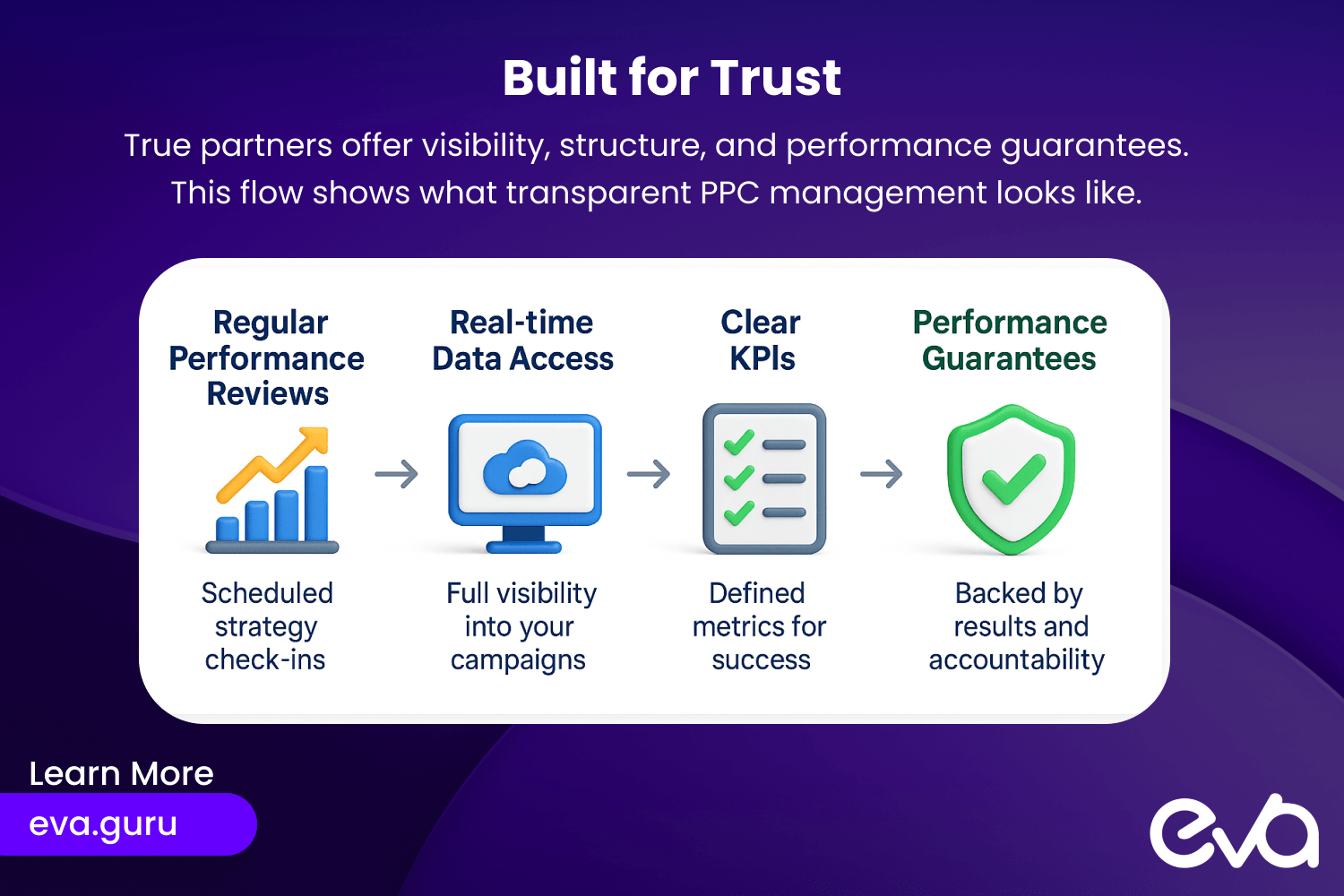
Perhaps the most fundamental issue plaguing the Amazon PPC agency relationship is a misalignment of incentives. Many agencies structure their business models in ways that don’t necessarily serve your best interests:
Agency Goals vs. Seller Goals
Typical Agency Goals:
- Maximize billable ad spend (especially when charging a percentage of spend)
- Retain clients with minimal effort
- Standardize service delivery across diverse clients
- Minimize specialized resources dedicated to each account
Seller Goals:
- Maximize profitability, not just sales volume
- Achieve sustainable growth without sacrificing margins
- Develop a brand that can eventually reduce reliance on advertising
- Respond adaptively to inventory positions, pricing changes, and competitive threats
Common Pitfalls to Watch For
The most prevalent misalignment occurs when agencies focus on spending more of your money rather than spending it more effectively. This happens when:
- Compensation is structured as a percentage of ad spend, incentivizing higher budgets regardless of efficiency
- The agency lacks robust profit analytics capabilities to understand true campaign performance
- Campaigns aren’t adjusted based on inventory levels, potentially driving sales for out-of-stock items
- Strategies don’t account for your specific business goals and stage of growth
Best Practices for Transparency and Accountability
True transparency in Amazon PPC management goes far beyond basic reporting. Here’s what should be standard practice:
What Transparency Looks Like
A company specializing in Amazon PPC should provide:
- Regular performance reviews that tie advertising to overall business metrics
- Clear attribution of which sales came from advertising versus organic
- Detailed breakdowns of performance by product, targeting type, and campaign structure
- Honest assessments of what’s working and what isn’t, with specific plans for improvement
- Real-time access to campaign data and performance metrics
Accountability Framework
Effective accountability requires establishing clear expectations upfront:
- Specific, measurable KPIs aligned with your business goals
- Regular cadence of performance reviews and strategy adjustments
- Documented processes for handling underperforming campaigns
- Clear escalation paths when issues arise
- Performance guarantees tied to business outcomes, not just advertising metrics
How to Choose the Right Amazon PPC Agency for Your Business
With so many options available, selecting the right Amazon PPC management expert requires careful vetting:
What to Look For
- Holistic Approach: The best agencies don’t view advertising in isolation but as part of an integrated strategy including inventory management, pricing, and conversion optimization.
- AI + Human Expertise: Look for agencies that combine sophisticated technology for data processing and automation with experienced strategists who understand the nuances of your category.
- Proven Track Record: Request case studies specifically related to your product category and price point.
- Transparent Pricing: Understand exactly what services are included and how performance is measured.
- Strategic Partnership: Your agency should function as a strategic advisor, not just a tactical executor.
Understanding Fair Pricing
Pricing models vary widely across agencies, but the structure should align with your success:
- Percentage of ad spend models can create misaligned incentives
- Flat fee structures provide predictability but may lack performance incentives
- Hybrid models with base fees plus performance bonuses often create the best alignment
- The cheapest option is rarely the most cost-effective when considering ROI

Conclusion: What Sellers Wish They Knew Before Hiring
The most common regret sellers express is not conducting thorough due diligence before selecting an Amazon PPC agency. Many discover too late that their chosen partner lacks the capabilities, technology, or alignment necessary to drive meaningful business growth.
Final Checklist for Vetting an Amazon PPC Company
- Do they have experience with your specific product category and price point?
- Can they provide verifiable case studies with measurable results?
- Do they have advanced technology and AI capabilities for optimization?
- Is their reporting focused on business outcomes rather than vanity metrics?
- Do they understand the full e-commerce ecosystem beyond just advertising?
- Is their pricing structure aligned with your business success?
- Do they offer a holistic approach that considers inventory, pricing, and conversion?
- Can they adapt strategies as your business grows and evolves?
By asking these questions upfront and understanding what truly differentiates exceptional Amazon PPC management experts from average providers, you’ll be positioned to make an informed decision that supports sustainable, profitable growth for your Amazon business.
Frequently Asked Questions About Amazon PPC Management
There’s no one-size-fits-all answer. Your ideal ad spend depends on your margins, competition level, product lifecycle stage, and business goals. Rather than focusing on an arbitrary percentage of revenue, work with your Amazon PPC management expert to determine a spend level that maximizes profitability while supporting sustainable growth.
While it’s technically possible, effective Amazon advertising has become increasingly complex. Between new ad formats, hourly bid adjustments, campaign structure optimization, and cross-channel strategy, most sellers find their time is better invested elsewhere. Professional Amazon PPC agencies bring specialized expertise, advanced technology, and economies of scale that typically deliver significantly better results than self-management.
Initial campaign restructuring and optimization typically show meaningful improvements within 2-4 weeks. However, the most significant results often emerge over 2-3 months as the agency fine-tunes strategies based on accumulated data. Be wary of agencies promising overnight transformations, as sustainable results require methodical optimization and testing.
Focusing exclusively on ACOS (Advertising Cost of Sale) without considering the broader business impact. While ACOS is an important metric, it doesn’t tell the complete story about profitability, organic rank improvements, brand building, or long-term customer value. The best Amazon PPC management approaches these campaigns as part of a holistic business strategy, not as isolated advertising efforts.
As you scale, your PPC strategy should evolve from primarily focusing on product visibility and initial sales to building brand recognition, defending your market position, and expanding your product line. Larger businesses benefit from more sophisticated campaign structures, custom analytics, and integrated strategies that coordinate advertising with inventory management and pricing.
How Eva Transforms Amazon Advertising Performance
Eva’s approach to Amazon PPC management stands apart through our unique combination of AI technology and human expertise. Our specialized platform doesn’t just manage your advertising—it orchestrates your entire Amazon presence for maximum profitability.
Eva AI for Advertising: Beyond Manual Optimization
Our proprietary Eva AI technology executes precision hourly bid adjustments based on real-time marketplace data, allowing us to capture opportunities that manual management simply can’t match. The system continuously monitors:
- Inventory levels to prevent advertising out-of-stock items
- Conversion signals to adjust bids based on performance patterns
- Competitor positioning and pricing changes
- Long-tail keyword opportunities other agencies miss
- Customer behavior trends specific to your product category
The Eva Four Pillars Approach to Amazon Success
Unlike agencies that focus solely on advertising metrics, Eva’s comprehensive approach addresses all four pillars essential for sustainable Amazon growth:
- Driving Traffic: AI-optimized PPC, DSP management, and off-Amazon funnels
- Optimizing Conversion: Content enhancement, pricing strategy, and Buy Box optimization
- Ensuring Inventory Availability: Inventory-aware advertising and replenishment forecasting
- Maximizing Profits: Comprehensive profit analytics and dynamic pricing prediction
Proven Results That Speak for Themselves
Eva has generated over $6 billion in sales for clients, optimized more than $1.6 billion in ad spend, and achieved an average 51% increase in profits for our partners. Our comprehensive approach has also helped clients reduce operational costs by 40% and decrease stockouts by 95%.
Ready to see what Eva can do for your Amazon business? Claim your free audit and forecast today by visiting www.eva.guru or calling our team at +1(858) 630-4777
Eva is an AI-powered full-service e-commerce agency specializing in Amazon, Walmart, and omnichannel platforms. Our team combines advanced AI technology with experienced e-commerce experts to deliver sustainable growth and profitability for sellers. We work with established brands looking to maximize their performance across multiple e-commerce channels.


